Four years after leaving office, he’s officially the world’s most admired man. But what is Obama’s legacy? The former president talks Trump, Biden and America’s new dawn
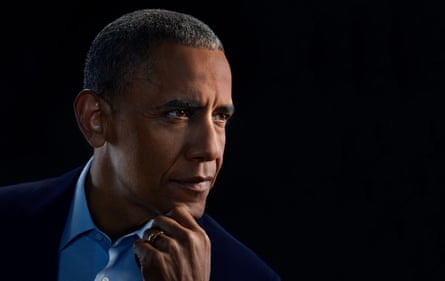
Last modified on Sat 21 Nov 2020 20.53 AEDT
If you’re a former US president, there’s one guaranteed way to be remembered fondly – make sure you’re followed by a truly awful successor. It certainly worked for Barack Obama: you only had to mention his name these last four years to send millions of Americans (and others) into a reverie of nostalgic longing. The gulf in calibre between Donald Trump and his predecessor was so wide that each day Trump sat in the Oval Office, Obama’s reputation shone a little brighter.
Not that he needed the comparison. Even before Trump took office, Obama left the White House with unusually high approval ratings: 59% of Americans thought well of him, according to Gallup – and that figure has held ever since. Outside the US, Obama recently displaced Bill Gates as the world’s most admired man, according to YouGov, which is handy as Obama is married to the world’s most admired woman.
If you had to construct the unTrump, Barack Obama is what you’d come up with: cerebral and well-read; deliberative; self-critical to the point of self-doubt; a faithful husband and conspicuously devoted father. He was a chief executive whose team was so functional that, over the course of eight years, there was scarcely a leak; not a single person was forced to resign in disgrace, let alone face legal proceedings. The closest the Obama White House got to scandal was when he wore a pale “tan” suit in 2014, a look some considered unpresidential. Not for nothing did they call him “no drama Obama”.
If you had to construct the unTrump, Obama is what you’d come up with: cerebral, well-read and self-critical.
There is much to criticise in his record, whether it be a covert drone war that saw 10 times the number of strikes as were authorised under George W Bush, resulting in the loss of as many as 800 civilian lives in Pakistan, Somalia and Yemen – or a failure to enforce his supposed “red line” on the use of chemical weapons in Syria, a failure that Bashar al-Assad seemed to read as a licence to keep killing his own people. You can criticise Obama for failing to do enough for small-town and postindustrial America, so that people who had voted for Obama in 2008 and 2012 voted for Trump in 2016. Still, and even taking all that into account, from the vantage point of 2020 the Obama presidency looks like a calm, flat sea before the roiling tempest of Trump.
The outgoing president features only a little in Obama’s 751-page memoir, A Promised Land, which covers the period from the author’s entry into politics – winning a seat in the state senate of Illinois in 1995 – until the moment that may have ensured his re-election: the killing of Osama bin Laden in 2011. A second volume will address the rest. The book is written in the same voice that made Dreams From My Father a bestseller, letting the reader in on the author’s inner monologue – as Obama observes his own life as it plays out, questioning his motivations, noticing his hypocrisies.
Trump’s cameo role is that of villain, the lead proponent of “birtherism”, spreading the racist smear that Obama was not really born in the US, “a conspiracy theory he almost certainly knew to be false,” Obama writes. Trump also makes an appearance as the butt of Obama’s jokes on the fateful night in 2011 when, delivering the traditional comic turn at the White House Correspondents’ Dinner, the president mocked Trump as a man whose idea of an important decision was choosing between the boys’ and girls’ teams on Celebrity Apprentice. Was it that humiliation that stung Trump into seeking the presidency, just to get even?
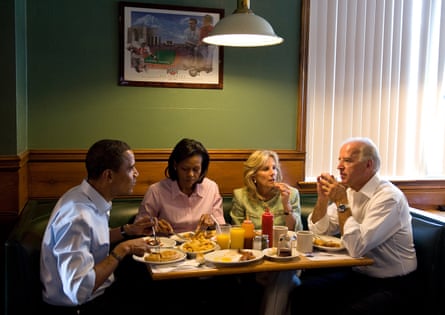
Had this month’s election gone the other way, the publication of Obama’s book would have been tinged with melancholy, even futility. He would have been celebrating a legacy that was halfway to being dismantled. For if the Trump presidency had a defining theme, it was its obsessive desire to destroy the record of Barack Obama. Trump pulled out of the Paris climate accords and Iran nuclear deal, both brokered by Obama; he itched to destroy the Obamacare reforms to health provision. Doubtless, he will try to get more of that work of erasure done in his remaining weeks in office, between now and January 20. But armed with a second term, Trump would have had four years to finish the job.
Now Joe Biden will undo that undoing. He’s promised to reverse some of Trump’s reverses the day he takes office: rejoining the Paris accords and the World Health Organization, for example. Biden-Harris may not amount to a third term of Obama-Biden, but it will ensure the first two are not erased.
Thanks to the pandemic, there was to be no face-to-face interview with the Guardian, not even by Zoom. Instead, as befits a writer – especially one who likes to keep control – the former president opted for an exchange on the page: written questions, written answers. Of course there are a thousand things anyone would want to ask him. Is the book called A Promised Land because he feels he never quite got there? Did he waste the power he had when he had it, by trying to compromise with Republicans who never had any interest in meeting him halfway – but instead wanted to hobble him from the start? Did he let the bankers culpable for the crash of 2008 off too lightly?
Obama
chose which questions to answer, opting perhaps for those designed not
to catch him out but to encourage him to open up. That would fit: if
Trump relishes the combative shoutiness of Twitter, Obama has always
been a bit more Instagram – curated and personable. The 44th US
president doesn’t much like talking about the 45th, but Trump is present
all the same, between the lines. Obama suggests that he and Trump were
telling duelling stories about America. Now, at the very moment Trump’s
story has been rejected and cut short, Obama has a new chance to tell
his.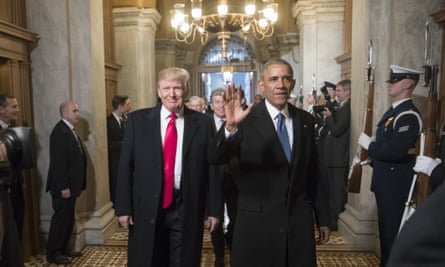
From fake news to the climate crisis: the view from the Oval Office
Great question. Because the truth is, in a lot of ways, the job of a writer and the job of a politician overlap. Both are trying to tell a story that connects with folks. I mean, Donald Trump and I ran on very different stories about what America is all about, but you can’t say either of us didn’t tell a story.
As a writer, you are also better able to avoid some of the pitfalls that politicians encounter. For example, there’s a temptation, in politics, to talk about voters in broad categories: white voters and Black voters, Democrats and Republicans, hockey moms and soccer moms. Those categories can give us some understanding of people’s lives, but they don’t show us what’s happening inside – their complexities and contradictions. When you’re a writer, your job is all about figuring out how to show your readers that interior life. I think that’s a perspective we could use more of in our politics.
You write that for your aides, David Plouffe, David Axelrod and Robert Gibbs, “the immediate formula for racial progress was simple – we needed to win” in 2008. Given all that we saw this summer, were they – were we – naive in thinking that the act of electing the first Black president might ease America’s racial pain?
Obviously, we have a long way to go on race in this country. You won’t find a quote from me, or my aides, saying that my election would somehow usher in a post-racial society. But I also don’t want to undersell the fact that there is a generation of kids out there who would turn on the TV and see a president who looked like them – with a cabinet and a staff by his side that reflected the fuller palette of our country’s diversity. And, by the way, that didn’t just have an impact on African American kids. It had an impact on white kids, too, who will enter the world knowing it’s not unusual for a person of color to be in a leadership position.
This makes me feel old to say, but the reality is that those kids – kids from every background who grew up when I was president – have already done so much to move our country forward. They’re the ones who took to the streets this summer to lead the fight for racial justice. And now, our roles are reversed: they’re the ones on my television set, inspiring me.
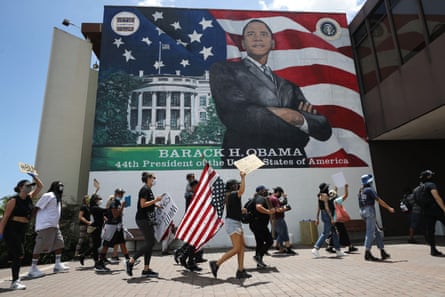
In the book, you describe repeatedly being on the end of campaigns of deliberate disinformation – whether about your birth certificate or healthcare plan. Now that conspiracy theories have become mainstream, how vulnerable is truth, and what can it do to fight back?
Well,
the truth is the truth. Some people just think it’s in their interest
to lie about it. Sometimes it works, especially on social media where
you’ll trust something you hear from a friend or an uncle or an outlet
that tells you what you want to hear, but you’ll shut out a fact-checker
from a publication you’ve been told is slanted against you. The term
“information bubbles” sometimes belies the danger: without a baseline of
broadly shared facts, democracy is going to be in constant crisis.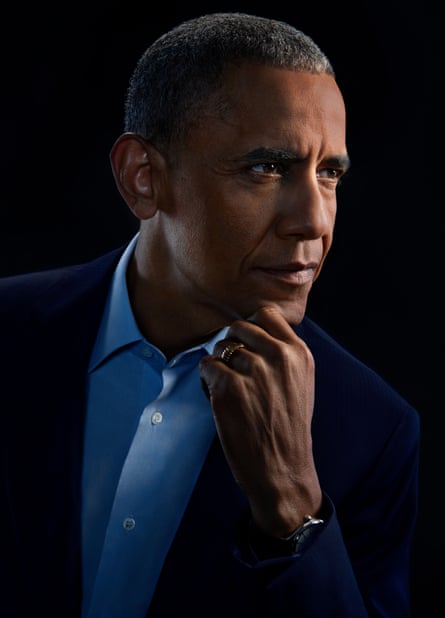
There’s no one solution here. It’s a complicated knot that’s going to take a while to get untangled. These conspiracy theories can take on a life of their own online, and platforms haven’t quite figured out how to grapple with them. They’re always playing catch-up – trying to stamp out the lie after it’s out in the ether. And when people and media companies who should know better don’t disavow or distance themselves from these obvious conspiracy theories, folks don’t know what to think. So all of us have a role to play in bringing us back toward a common set of facts – elected leaders, tech companies, the media, our education system and all of us as citizens.
You played golf as well as some basketball with your aides – but were there times when even you could not unwind? How do you recharge?
Golf was a big help. The truth is, when you’re president, it’s one of the only ways you can consistently get fresh air.
I also made sure to recharge every evening at 6.30pm when I would have dinner with Michelle, Sasha and Malia. We’d eat some good meals and catch up on our days. That was one of the best parts of living above the store, as I liked to call it. I could spend quality time with my family every night, even if that meant that I needed to go back to work after dinner.
The reality is, for better or worse, I’m a pretty steady guy. And over the course of my time in politics, whether I was dealing with losing New Hampshire during the primary or the bottom was falling out of the economy, I found that I was often my most level-headed when things were going to hell.
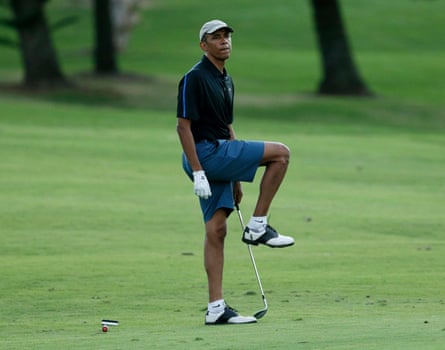
You close your book with a meditation on a question that nagged at you after the success of the operation to catch Osama bin Laden: was it only possible to muster that “unity of effort” when the goal involved killing a terrorist? You go on to say that there has not been a similar focus on the climate crisis. You made a breakthrough in Paris – but in terms of the climate, what didn’t you achieve and why? Is it the case that even someone in the most powerful job in the world can only do so much?
You know, when I was writing that passage, I wasn’t just lamenting politics as it is. I was imagining politics as it could be. What would happen, I wondered, if we could rally that kind of energy and unity to educate our children or eliminate homelessness? What might the country feel like if we could stir enough passion to eliminate greenhouse gases or reduce poverty?
I joke in the book that my staff would have laughed at this idea for being too utopian – and look, I recognize it’s a far cry from the politics we have today. But the reality is, an issue like climate change isn’t going to be solved by only one party – or even by only one country.
That’s one of the lessons you learn as president, over and over again: you learn what you can’t do on your own. Whether you’re trying to make a difference domestically or internationally, you need to build coalitions, invest in relationships, find ways to work together. That’s how we rallied the world to confront Ebola before it became a pandemic like we’re seeing now.
And it’s why Paris was such a big deal. With that agreement, pretty much the entire world recognized climate change as a problem and committed to being a part of the solution. And that’s why I am so heartened Joe Biden will be rejoining the agreement as president.
Now, do I think rejoining Paris is all we need to do to combat climate change? Of course not. We need to make massive investments in clean energy, clean transportation and resilient agriculture. We need to ramp up research and development into new technologies that will create jobs and reduce our dependence on carbon. I can go on and on. But at the end of the day, this challenge will only be solved when leaders from across oceans and the political spectrum step up to the plate.
No comments:
Post a Comment